Billy Coffey's Blog, page 26
October 21, 2013
Dying well
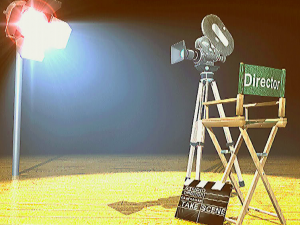
image courtesy of photobucket.com
The shot hits me just below the chest, shattering some important organ. A lung, maybe, or an intestine. My left hand goes there. I feel the wetness through my fingers and fall to my knees—my death pose. My eyes are open (they should probably be closed, but no way am I going out like that), as is my mouth. My face holds a look of shock that says This can’t be happening, and I think that even as I drop to the grass. I’m still. I don’t even move when the grass pokes into my mouth and tickles my gums.
A skinny shadow falls over me then, and a loud voice says, “Cut.”
I raise my head. “Good?”
My daughter stands there, one hand on her hip and the other holding the camera. “That wasn’t very good, Daddy.”
My son stands next to her. He’s holding the water pistol at his hip in much the same fashion as he imagines Doc Holiday once did. “Nope,” he says. “That weren’t too good a’tall.”
“I don’t understand what I’m doing wrong,” I tell them. “I grab my shirt like you said, I tumble over like you said, I lie there like you said. You want me to close my eyes?”
I don’t want to, but at this point I’ll do whatever it takes to have this over with. We’ve been out here in the yard for two hours. Making a movie, my daughter says. This week, that’s what she wants to do when she grows up. I said fine, let’s make a movie. I figured it couldn’t be worse than last week, back when she wanted to be a veterinarian. I don’t even want to talk about that.
My son was more than willing to participate, especially when my daughter informed him of the plot: Bad guy captures the princess, good guy shows up to rescue her, bad guy gets it in the end. It’s all gone smoothly until this last scene. The final showdown isn’t going well. The dialogue is crisp, the action top-notch. That’s not the problem.
The problem is me. I’m not dying right.
That’s what they keep saying. “You ain’t dyin’ right, Daddy” from her and “The way you’re doin’ it’s the sucks” from him. He says if this keeps up the camera batteries are gonna die, and they’ll do a better job of it than I am.
“I don’t understand what you want me to do,” I say. “I’m telling you, this is how people die. I watch a lot of TV.”
“It ain’t right,” my son says.
My daughter nods. “I don’t know how they do it on the TV, Daddy, but that ain’t how you die.” She turns to her brother and says, “C’mon, let’s go see if we can figure out something else.”
So I lie there in the grass while my children conduct and impromptu director’s meeting, which most likely revolves around what sort of sandwich they want for lunch and how hard it is to find quality actors these days. Me, I’m just thinking about how to die right. It’s a heavy subject. And like most heavy subjects, pondering it brings all sorts of thoughts to mind.
Because that’s what we’re all doing, right? We’re dying. We don’t like to talk about existence in that term. We say we’re growing, maturing. Living. But an argument could be made that our first peek at this world—that first cry when we emerge from the womb—is the only moment we are truly alive. All the moments that come after are spent in the shadow of death.
And I wonder: Is that why I can’t nail this last scene in my daughter’s first movie? Is that my problem? Have I gotten life all turned around, thinking the things I need to do and say don’t need to be done today because there’s always tomorrow? How much time have I wasted waiting for God to act, and all this while He’s been waiting for me, telling me to embrace my days, to ravish them?
How much time have I wasted trying to figure out how to live right instead of how to die right?
“Hey,” I say. “Let’s do this again.”
My daughter says no, there’s been a change of plan. My son’s going to be the bad guy now. He thinks he can do a better job.
“No,” I say. “One more try.”
He smiles and attacks, I laugh and defend. We brawl and battle and wail. Each squirt of our water guns brings joyful laughter. Finally, I lunge into the nearest bush, clutching my mortal wounds, and then collapse with a flourish into the arms of heaven. I embrace that scene. Ravish it.
My daughter yells, “Cut! Wrap!”
It was a glorious death.

October 17, 2013
Power to the people
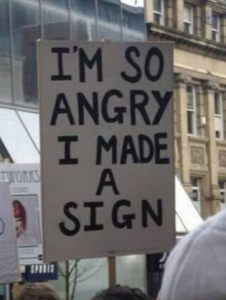 I’ve seen him off and on for the past three weeks, a Monday morning here and a Thursday afternoon there. From what I can tell, there is no set schedule. Maybe it only happens when the mood strikes—when the anger grows too hot or the despair sinks too deep. I’m not sure. But I’ll give him this: he’s dedicated, despite it all.
I’ve seen him off and on for the past three weeks, a Monday morning here and a Thursday afternoon there. From what I can tell, there is no set schedule. Maybe it only happens when the mood strikes—when the anger grows too hot or the despair sinks too deep. I’m not sure. But I’ll give him this: he’s dedicated, despite it all.
He was standing on the corner the first time I saw him. Technically speaking, it was still the gas company’s property, though the spot he’d chosen was on the outermost edge where two main roads converge. To be more visible, I thought. To make sure he was seen.
Older gentleman, dressed in pressed khakis and a brown button-up. Thin, white hair swept to the side in the front, trying but not managing to cover a bald spot. The breeze whipped it, giving the appearance of snow falling up. The sign he held was as large as himself. Scrawled on both sides was a long list of grievances against the gas company itself.
Racism, discrimination, and greed were the only three I could make out that first day. Since then, I’ve managed to catch sight of price gouging and lying as well. The rest are jumbled together and slanted along the big piece of cardboard, as though the charges came so quick and numerous that he feared space and memory would run out.
I passed him by that first day and have done the same all the days after. When the light is red and the radio station is fixed, I’ll look over. Check on him. He’ll see me and raise his sign a little higher, and then the light will turn green and I’ll move along. That seems to be what everyone else does, as well. They just pass him by. We’re all busy, you see. We’re all just trying to get through our days. One old man with a sign that may or may not offer a window into his fragile state isn’t enough to give us pause, at least not enough pause to stop and ask what exactly he’s trying to accomplish. Even the folks at the gas company don’t seem to care. They haven’t even given the man enough thought to ask him to leave.
He was back yesterday, but not at the edge of the road. A few weeks of protesting without raising either sympathy or scorn has convinced him to change his tactics. He was now standing on the sidewalk, directly at the front door.
From what I could tell, it hadn’t made a difference.
To be honest, it’s funny in a way. Also sad. I don’t know what has driven him there and I don’t know if I would agree with his reasons, but a part of me is proud of him. Right or wrong, he’s stood up. He’s making his voice known. Of all the freedoms we enjoy, I can’t think of many more important—more necessary—than that.
Maybe that’s why I feel so much pity for him as pride. Because no matter what it is, it takes courage to stand up and speak. I know this. And all that courage can melt in a moment when you utter those first words and find only silence and apathy in return.
He was there again today, fighting the power. Standing up to The Man. Still with that determined look on his face. The light turned yellow and then red. I fixed the radio station and looked. He met my eyes and raised his sign a little, wiggling it. I gave him a thumbs up. He returned the same. Just two guys giving one another the same encouragement:
Carry on.

October 14, 2013
Catching the sun
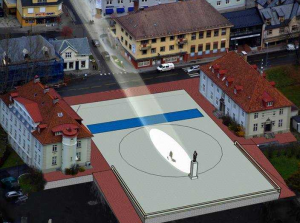
graphic depicting reflected sunlight in Rjukan, Norway.
The day is gloomy as I write this, rainy and chilly and overcast—the sort of weather that makes summer feel far behind and winter just around the corner. The leaves have gone from green to bright yellows and reds, but even now there is a crunchy blanket of dead brown ones on the ground. The robins are gone, as is the garden. All that’s left of both are the empty nests in our trees and the canned vegetables in our cupboards.
You would think I’m used to it, this shifting of the seasons. Four times a year for forty-one years, that means I’ve gone through this 164 times. I should be a pro. I’m not. Aside from Christmas, I’ve never liked winter. I’ve read there are more suicides between October and March than any other time of year. I can understand that. The cold and dark can get a person down. Around here, people say winter is a season that gets inside you.
I was thinking about all this a little bit ago while digging through the stack of papers on my desk. Midway through was a story about a Norwegian town called Rjukan, whose people know all about the cold and dark. Settled deep in a valley floor, the sun moves so low across the sky in winter that it leaves the entire town in perpetual evening. The sun doesn’t shine in Rjukan at all between September and March. It gets so bad that locals take a cable car to the top of the mountains just to stand in the light.
Sounds like a pretty horrible way to spend half your year, doesn’t it? But if things go according to plan, all that is about to change.
Over the summer, helicopters hoisted three massive mirrors 450 meters above Rjukan and anchored them to the sides of the valley. Called heliostats, the mirrors are controlled by computers to follow the path of the sun and reflect a day-long beam of light that will fall directly into the center of the town square. No more cable cars to the mountains, no more endless gloom. The people of Rjukan will only have to take a short walk to the square to catch a bit of sun. They will all gather there and be together. They will all stand in the light.
I’m thinking about that little town a lot on this gloomy morning.
I’m thinking about how it really is true that winter gets inside you. It can hunch you over and make you wince, it can steal your smile, and oftentimes it doesn’t matter at all what the season is on the outside. I know people who walk around in July, but it’s still winter in their hearts. I guess that’s sometimes by choice. More often than not, though, I really don’t think it is. This world’s a tough place. It can hurt.
But I’m thinking about those three mirrors most of all, the ones now sitting high in that Norwegian valley and catching that sun. I’m thinking about how that’s what you and I should be—reflectors. Shining a light into the dark places. Bringing warmth to the cold around us. Not a light and a warmth of our own making, but ones greater and eternal.
Yes, I think so.

October 10, 2013
Playing catch
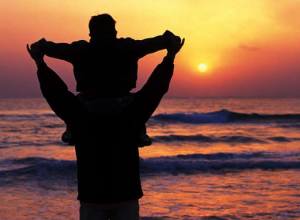
image courtesy of photobucket.com
He’s nine now, a beast of muscle weighing more than seventy pounds, but my son still jumps. Most times it’s designed to catch me off guard—when I come home from work, maybe, or as I’m walking into the living room. I’ll catch a blur out of the corner of my eye, a small, fuzzy flash, and then he’s airborne. Reflex takes over from that point; whatever may happen to be in my hands gets dropped or tossed or fumbled, and I stretch out my arms. Next comes the entire force of his body crashing into me, driving me backwards. He wraps his arms and legs around me and pauses, leaving the two of us slowly rocking. It reminds me of how Navy jets land on carriers.
I don’t ask him why he still does this. To the best of my recollection, that act remains one of the few holdovers of years now gone and never to return. My son’s Fisher Price toys are collecting dust in the attic and his teddy bears are gone and so are the Lightning McQueen footie pajamas, but for some reason jumping into my arms isn’t considered childish at all. And given the frequency of these flying sneak attacks, I’m even led to consider that such a thing is important to him. Necessary, even.
Still, I don’t ask why. I suppose some of the reason is because I’m afraid broaching the subject will somehow end things. Maybe the next time my son gets it in his head to leap from the couch and aim for my chest, he’ll think twice. Maybe he’ll wonder himself why he’s doing it, or wonder if the reason I asked in the first place is because I really don’t want him doing it anymore. It’s a complicated thing, having a son who’s nine. Those are boys who want nothing more than to be men. I don’t want to mess this up. And to be honest, I’m not too anxious to see him as a man just yet. I’d rather keep thinking of him as my little buddy for a while longer.
He told me once that he can’t wait for the day when he jumps into my arms and bowls me over. He’ll know he’s big then. I don’t doubt that, but I also don’t think that’s the whole story. I think it boils down to something deeper than wanting to have muscles like The Rock (my son says this often) and to walk around all tough like Chuck Norris (which he says just as often).
I think it comes down to faith.
He’s a smart kid, my boy. Knows more about the world than I think he does. The television is still largely off in our home, especially with regards to the current goings-on in the world, but he still knows. His friends talk at school, as do his teachers. And even if he’s young enough to still be kept safe in a small-town bubble, he knows there is a shadow over the larger world. My son hasn’t seen evil yet, but he knows it’s there. And even if he’s brave enough and old enough to have discarded the notion that there is a monster in his bedroom closet, he’s beginning to see there really are monsters out there, and that most times they look just like people.
He knows that many of the kids in his school don’t have both a mommy and a daddy, and that some of them don’t have either. He’s seen classmates shuffled in and out never to be seen or heard from again, scattered here and there through divorce or job loss or so much pain that their tiny minds simply broke into pieces. A notion like grace is still somewhat foreign to him, but he can grasp the truth that all of those kids could have been him in another life.
That, I think, is why my son still jumps. Because he wants—needs—to know that when he does, his daddy will catch him. His daddy will drop everything and stand firm and hold out his arms, and even if it’s scary flying through the air the end is always both soft and hard and full of love.
That’s what I think. I don’t know if that’s right or not, but I know this—I’ll always catch my son. Every time.

October 7, 2013
Eddie’s story
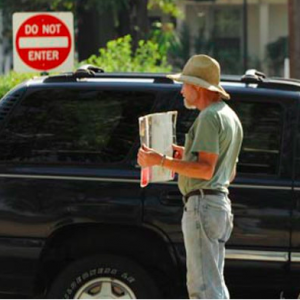 I see him raise a hand out of the open passenger window and think he’s shooing a bee at first. He’s allergic to bees and swears the little buggers can smell that in a person. But no, that’s not what he’s doing. He’s instead waving to the bum who has taken up residence at the guardrail abutting the interstate onramp. That isn’t so surprising. Neither is the fact that the bum waves back, flittering his cardboard sign (HUNGRY, LONELY, TIRED is printed in black Sharpie on the front) and grinning back.
I see him raise a hand out of the open passenger window and think he’s shooing a bee at first. He’s allergic to bees and swears the little buggers can smell that in a person. But no, that’s not what he’s doing. He’s instead waving to the bum who has taken up residence at the guardrail abutting the interstate onramp. That isn’t so surprising. Neither is the fact that the bum waves back, flittering his cardboard sign (HUNGRY, LONELY, TIRED is printed in black Sharpie on the front) and grinning back.
“That’s Eddie,” he tells me.
“Eddie.”
“Yep.”
I keep my eyes to the windshield and nod. “And you know this because—”
“—I stopped to talk to him the other day—”
“—Of course you did,” I say. Because that’s what the man beside me does. He talks to people. Talks to anyone. Anywhere. He’s a property owner by day, running a mini-kingdom of rented homes and apartments. I think he’s secretly a combination of St. Paul and Andy Griffith. To him, there are no strangers, there are simply people he isn’t friends with yet.
“And he’s Eddie?” I ask.
“Yep.”
He turns and sticks his head out the window. I look in the rearview. Eddie’s still looking, still shaking his sign. A blue SUV stops beside him. The driver hands him something that might be a dollar bill.
“Did you give him something?”
I’m nodding even before he says, “I bought him lunch,” because that’s what the man beside me does, too. The HUNGRY and LONELY and TIRED are the people he tries to love most because those are the ones he says Jesus loves most. We both love Jesus, my friend and I. Sometimes I think he might love Him a little more.
I smile and ask, “What’d you get in return?”
“What I always get.”
And here is my favorite part, it always is. Some say no act is truly altruistic, that there is a bit of selfishness in everything. That might be true, even with my friend. Because he wants to help and he wants to love just as Jesus said we all should, but he always asks for something in return. He always asks for their story. They all have one—we all have one.
“Did you know Eddie’s been to every state?” is how he begins. I just drive and listen. “Born in Cleveland, but he didn’t stay there long. Parents were awful, that’s usually how it goes. Drunks that beat on him. He ran when he was sixteen. That was twenty years ago.”
“So what’s he do?”
He shrugs and says, “Just drifts. Went west first, all up and down the coast, then made his way east slow. Even went to Thailand once. Worked on a steamer. Only job he’s ever had.”
I don’t say anything to this and wonder for a moment if it’s a trap. We’ve had this discussion many times, my friend and I. I’ll start by saying people like Eddie really could find work. Menial work will still bring money. There’s help out there if Eddie wants it, I’d say, but a lot of people like him live the way they do through choice rather than necessity. My friend agrees in principle. He also doesn’t think that matters much.
“He was married once,” he continues. “She died. Had cancer while they stood in front of a justice of the peace. Eddie knew it and married her anyway. Told me he loved her, and that was reason enough. That was eight years ago. He came east after that. I think he’s trying to run from the memory.”
“I think we all do that,” I say.
“Eddie’s smart. Not with that,” he’s quick to add, “I mean smart like other people are smart. He has dreams.”
That’s the last my friend says of Eddie—“He has dreams.” We end up at the Lowe’s to get what we’ve driven to town for. By the time we head back, Eddie’s gone. I don’t know where he’s gone. My friend probably does, but he doesn’t offer.
I’ve told him many times I wish I could do what he does—stop someone, notice them, help them. Ask them their story. I guess such a thing just isn’t in me. I’m a shy person. Maybe I don’t have enough Jesus.
Still, I think we all need the reminder that all those lost souls we see and read about—those people we sometimes lie to ourselves and think aren’t like us at all—really are. They’ve loved and lost. They’re still searching. We’re all people, and in many ways we’re all hungry and lonely and tired. It’s such an obvious statement, and maybe that’s why it escapes us so often.

October 2, 2013
Batman Coffey
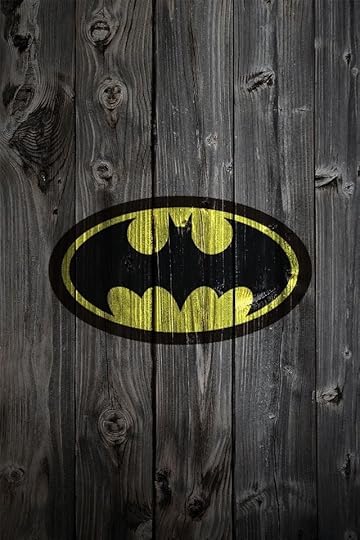
image courtesy of photobucket.com
My son wants to change his name.
It isn’t that he’s unhappy with the one he has now. It’s fine, he says. It isn’t kooky or hard to say, and it’s only one syllable. I asked him why the one syllable thing is so important. He told me that one syllable words are easy to spell. He said there was a girl in his class last year named Shenequia, and she had a horrible time trying to spell her name.
“Her name had THREE syllables, Daddy,” he told me. “It took her forever to write it.”
So it’s nice to know that deep down he’s okay with what he’s called. That’s not the reason. The reason is something deeper, more personal.
He didn’t have a say in it.
And he should, he says. Because it’s HIS name after all, not mine or my wife’s, even though we were the ones who named him. And it’ll be his forever. Shouldn’t he have had a say in something so important?
Truth is, he had a point. So I asked him what he would name himself if he could. His answer?
Batman.
Batman Coffey.
My answer was no.
This is really all just a small part of a larger problem for him. Call it a pre-teenage bout of philosophical angst. He’s starting to become aggravated by things that plague us all from time to time.
It’s not just his name that’s had him troubled lately. He’s a little upset that no one asked his permission to send him into this world, too. Not that he’s upset with his life, or unthankful, or that he’d much rather NOT be born, or that he isn’t grateful for both the life and family he has. It’s just that, like his name, he didn’t have a say.
Nor, he says, will he have a say in when he dies. He understands on a rudimentary level that there are things he can do to prolong his life—things like not smoking and not drinking and eating right and exercising—but on a basic level he also understands that you can do all of these things and still be hit by a car tomorrow.
It really is depressing, he says. And he says that if you don’t have a choice in what you’re called or when you die or that you were even born, what use is there, really? Why even bother.
Heavy stuff for a boy (I’ve been told he gets all of this honest, and I suppose that’s true). But I think it’s good to have these bouts of inner turmoil from time to time.
And really, it isn’t all bad.
Because yes, we’re born and named and depart from this life and there really isn’t much we can do about any of that, but what I want him to know—and what I must often remind myself—is that all the rest in the middle, that big chunk of in-between, is all up to us.
In the end, we decide.
We. Not others.
We’re not asked to be born, but we are the ones who make our lives.
We are not asked to be named, but we are the ones who decide how we leave our mark.
And the hour we will shed this world for the next is largely unknown, but we it is up to us how that death will be met, and what world that next will be.

October 1, 2013
Lightbulb moments
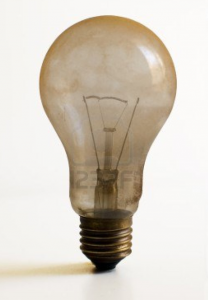 One of the tenets of redneck folklore is the belief that people die in threes. It’s a theory so ingrained around here that there is an influx of patients to the doctor’s office whenever a longstanding member of the community passes on. No one knows who will be next, and they don’t want to take any chances.
One of the tenets of redneck folklore is the belief that people die in threes. It’s a theory so ingrained around here that there is an influx of patients to the doctor’s office whenever a longstanding member of the community passes on. No one knows who will be next, and they don’t want to take any chances.
I’m not sure how much truth there is in that conviction. People might die in twos or fours just as often as threes. But I do know this—light bulbs die in threes. At least in my house.
It began last week with the light in my son’s bedroom, which much have died a quiet and peaceful death sometime in the night. He rose out of bed the next morning, flipped the switch, and…nothing. A few days later it was the light above the kitchen sink, which yelped a pop! when my wife tried to turn it on.
Then last night I came upstairs to my computer and fumbled for the light switch behind the door. Just as I flicked the switch upward, blue and white sparks sprayed from the ceiling fan in a burst of violence that actually managed to shatter the light bulb itself. It was quite impressive.
What brought about this light bulb mass suicide is beyond me. Our home is not old and the wiring was expertly done. I can only surmise that everything has its life cycle. At some point the odds are in favor of more than one sputtering out at the same time.
The blown light bulb is an exercise in both physics and inevitability. The cause is fairly straightforward: a light bulb’s filament does not evaporate evenly, leaving it to develop spots over time that are thinner than others. Since the electrical current heats the filament evenly, the thin spots heat more quickly. The result is a pop! and then darkness.
What struck me as I stood there staring at the bulb was my reaction, which so happened to be the one my son and my wife had, too. Not anger or frustration. Not even disappointment.
Confusion.
Because a light is supposed to turn on when you flip the switch it’s connected to. I had a vast amount of experience to back that assertion. It was one of the few of my life’s givens, so much so that I’d perform the act without giving it a second thought. Flipping a light switch is faith at its purest, the embodiment of if-I-do-this-then-this-will-happen.
It’s easy to take such things for granted, though. I’ve spent my day keeping track of every light I turned on, from the bathroom light when I first got up to the light in my office nearly sixteen hours later. My total thus far? Thirty. I’ve turned thirty lights on today, and none of them has broken.
I’m already taking the light switch for granted again.
So maybe I needed the gentle reminder that all those everyday things I put my faith in are neither permanent nor flawless. Things that go well beyond light bulbs and into the very center of my life. The job I have today may go pop! tomorrow. The savings account to cushion a fall may be pulled from beneath me just before I land. And the very ones I love most may be the very ones who let me down the hardest.
That’s the nature of life, the consequence of living in a world that isn’t quite what it should have been. We’re all searching for something to hold onto, something that will give us a sense of security and knowing, and yet everything we have is like that light bulb—at some time and in some way, they will all fail in an impressive fashion and leave us standing in the darkness. Which is all the more reason to place more trust in God than man.
Our hearts are pocked with the scars of failed faith and broken trust. There’s nothing we can do about that. Disappointment is built into this world. But despite the fact that those light bulbs in our lives will shatter and explode from time to time, we still must flip their switches. We still must believe. That’s what life is. What Love is, too.

September 26, 2013
Don’t need it? Leave it here.
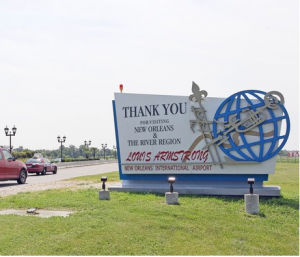 One more New Orleans story:
One more New Orleans story:
The great part about taking a trip is that you get to see things you’ve never seen before. The bad part about taking a trip is that very same thing. Tucked away here in the mountains, I know most every hill and holler and person. The things I look at every day are ones I’ve looked at for the last forty-one years. There’s an old expression about home being wherever you are. I don’t think that’s true. For me there’s only one place in the world worthy of that designation, and that’s a small town in Virginia.
That said, a city like New Orleans is about as 180 degrees from my town as any place could be. It’s big and busy and strangely ominous in a way you can feel but not describe. It’s a beautiful place full of wonderful people.
Also? They have the best trashcans in the world.
I’m thinking of one just outside of Louis Armstrong International Airport. Big, industrial trash can. Dented and cracked and chipped, with a thin layer of filth ringing a metal lid marked PUSH. I was in a hurry, juggling a bag and a hat and a phone and an empty coffee cup. I stopped there to rid myself of the latter, very nearly threw my phone away instead, then caught myself long enough to realize what I was doing. That small mental mistake was enough for me to slow down and pay attention to what I was doing. That’s when I saw the faded letters that had been stenciled onto the front:
DON’T NEED IT? LEAVE IT HERE
Looking back, I can only imagine how ridiculous I looked at that moment—one dunderheaded redneck gawping outside of a busy airport, looking like he couldn’t quite figure out how the fancy trash can worked. A part of me understood even then that was not one of my finer moments, at least on the outside.
On the inside, though? Well, that’s a completely different story.
Maybe it was that I was tired and in a strange place at 5:30 in the morning, but something about those six words got my mind reeling. I stood there, my hand stretched out to feed my cup to the can. Staring. Thinking, Wouldn’t it be great if there were places where we could leave all the stuff we don’t need?
Not just garbage like empty coffee cups and food containers (I could see poking out from the PUSH sign a piece of paper with a red heart drawn on it and an old lottery ticket). I’m talking about real garbage. The stuff we carry around with us constantly. The things we stuff our hearts and minds with rather than our pockets.
Shattered dreams. Broken hearts. Doubts. Anger. Despair. Jealousy.
DON’T NEED IT? LEAVE IT HERE
Wouldn’t it be great, doing that? Standing there and emptying yourself of all those things (I would imagine there would be no lid with PUSH on the front, just a wide opening so you could toss it all without fearing you’d miss), feeling yourself lightened as you walked away. Feeling yourself freed.
I wonder sometimes how much of what’s wrong with this world is because we’re all just so tired of carrying so much stuff around inside us, of having to cram in more and more garbage because we don’t have anywhere to leave it. That’s what I thought about, standing there at the trashcan outside of Louis Armstrong Airport on a rainy Saturday morning.
Still thinking about it when I boarded my flight home, too. Sitting there as the jet taxied from the gate, eyes closed to a gray sky. Offering a silent prayer for safe travels, feeling the worries and frustrations of the job and bills waiting back at home. That’s when I heard it—that small voice rising from a deep place in us all that feels like a bridge spanning one world and the next. Telling me Who’s in charge and Who’s watching over me—over us. Telling me to go on and give thanks, yes, and to pray for whatever I need, but also to hand over all of my garbage. He’d take it. He’d take it all and I wouldn’t have to carry any of it anymore.
Saying if I didn’t need it, I could leave it there.
Right at the foot of the cross.

September 23, 2013
Taxi cab confessions
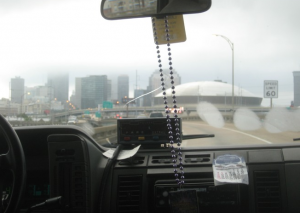 I had the honor this past weekend of flying to New Orleans to attend the annual Southern Independent Booksellers Alliance, where I signed a few books and listened to people much smarter than myself. It was a great time with great people, and I left with more stories than I know what to do with (I spoke with friend Karen Spears Zacharias and a man she introduced as “Paul” for nearly half an hour, only to find out when they left that Paul was William Paul Young, author of The Shack. To me, he was just Paul, the guy in the jeans and polo shirt who said he liked my hat).
I had the honor this past weekend of flying to New Orleans to attend the annual Southern Independent Booksellers Alliance, where I signed a few books and listened to people much smarter than myself. It was a great time with great people, and I left with more stories than I know what to do with (I spoke with friend Karen Spears Zacharias and a man she introduced as “Paul” for nearly half an hour, only to find out when they left that Paul was William Paul Young, author of The Shack. To me, he was just Paul, the guy in the jeans and polo shirt who said he liked my hat).
Yes, lots of stories. But for now, I want to tell you just this one about my cab driver:
She grabs my bag at the airport and chucks it into the trunk, smiles and calls herself Antoinette. It’s a pretty smile that’s all white teeth and kindness, and when I tell her I’m Billy she says, “You ain’t from nowheres around here, is you?”
“No’m,” I say.
She looks at me up and down and gives a sad shake of her head. “Careful child,” she says, “this town’ll chew you up and spit you out. Good thing Antoinette’s here.”
And even though I don’t know this lady and have never seen her before, I think that’s right. I think that’s exactly so.
She settles me in the backseat and climbs in behind the wheel, all arms and legs and long, braided hair. We exchange the bustle of the airport for the bustle of the freeway. I’m gawking like a tourist, trying to see everything. She’s watching in the rearview and shaking her head.
“Just you, son?” she asks. I say yes, that my family’s back home. “Well, ain’t no thing. It be just me and my cab.” She nods and gives me half a smile in the mirror, as if what she’s just stated makes her happy only because things are what they are. They are what they are, and there’s no changing them. “Kids gone, man gone.”
“Gone where?” I ask her.
Antoinette says “One in the ground” like she’s saying the hotel is just up the road a piece—all fact, little emotion. She makes the sign of the cross. I don’t know if it’s for the kids or the man. “Other’n done left.”
I don’t say anything. Buildings blur outside the window. Beyond them the sky touches the ground in a straight line that ends at my eye level. A crazy thought enters my mind that if Antoinette takes a wrong turn somewhere, we may just tumble off the edge of the world. For not the first time today, I miss my mountains.
“Man gone, too,” she says finally. Another nod, a bigger smile. This time, she really is happy that things are what they are. She’s happier that there’s no changing them. “Done took off with some floozy. She can have’m. Twenty year we together. Twenty year.”
She looks at me again. I bend my head down and study the hat in my hands, not knowing what to say. I’m sorry seems too petty, even though I am just that. One in the ground, one more done left. Another taken off. Just her now. Antoinette and her cab.
“You learn,” she tells me. Her eyes are still in the mirror when I look up. Still looking at me. The cab is cutting through traffic at over ninety miles an hour, but Antoinette’s eyes don’t have to see the road because the cab knows the way.
“Learn what?” I ask her.
“You learn to get by. Keep goin. Dream on. You got the faith, son?”
“I do.”
Now she looks away (and just in time, another second and we’d have met the back end of a dump truck). I can’t see her mouth, but Antoinette’s eyes wrinkle at the corners.
“There you go,” she says. “There . . . you . . . go. You might be alright, Willie. Cause all we got’s in the end’s our faith. This town can get hard on’ya, but you be alright. I be alright. One in the ground, one gone, one shacked up with Susie-spread-your-legs. We all got pain, don’t we?”
“We do.”
“We do,” she agrees, then rubs the silver cross dangling from the mirror. The front of it is dull, almost the color of pewter. I think to myself that cross has been rubbed a lot over the years. It’s like Antoinette’s faith—beautiful because it’s so worn.
“I’m sorry for your trials, Antoinette.”
The words come out sudden, so fast that I can’t pull them back in even if I want. I think maybe I should. Antoinette doesn’t seem the sort of person who’d take the pity of another, no matter how well-intentioned that pity would be.
She shakes her head. “No sir,” she says. “Don’t you be sorry no way. I ain’t. I know the secret, you see.”
“And what’s that?”
She looks at me again. “Ain’t no trials, Willie, no matter how much we call our troubles that. Hard times, they just God’s mercies in disguise.”

September 20, 2013
Kicking and Screaming
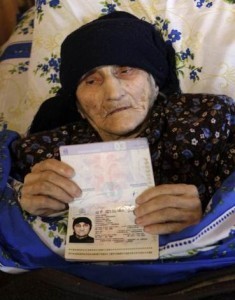
image courtesy of washingtonpost.com
My friend passed the newspaper across the table and pointed to the article in the bottom corner. The headline read, “Georgia claims it has world’s oldest person, 130.”
“This is who I want to be.”
“You want to be an old woman?” I asked him.
“No,” he said. “Read it.”
I did. Antisa Khvichava is her name. Has a son, ten grandchildren, twelve great grandchildren, and six great, great grandchildren. And according to local authorities, she was born on July 8, 1880.
The article went on to say that a birth certificate was lost and so would not be forthcoming. Proof, it seemed, had been reduced to a few old Soviet documents and the word of local officials, neighbors, and descendants. She lives with her seventy-year-old son in the mountains near her birthplace.
I looked up at my friend, who was in the middle of a sip of his coffee. “That’s what I want,” he said. “To be that old.”
“Really?”
“Sure. Can you imagine being the oldest person in the world? How cool would that be? Do you have any idea how much wisdom that lady must have?”
I wasn’t sure. About any of it.
“She’s a hundred and thirty,” I said. I checked the article again. Ms. Khvichava’s fingers were cramped and deformed by age, but people said she continued to have a sharp mind. Somehow, that didn’t bring me much comfort. “You really want to live that long?”
“Absolutely,” my friend said. He picked up the sports section and thumbed through the baseball scores. “I wanna live a full life and then be dragged kicking and screaming out of this world.” He folded the paper and placed it in the middle of the table. “Don’t you?”
“I don’t know,” I said. “What’s a full life?”
He shrugged. “Wife, kids, good job, retirement, grandkids. Maybe some golf.”
“Okay,” I said. “I’ll buy that. But still…a hundred and thirty?”
“Why not? How old do you want to be when you die?”
It was a question I’d never been asked, and one I had never thought to ask myself. “I don’t know,” I said.
He looked at me and sneered. “Better start thinking about it, then,” he said. “You ain’t getting any younger.”
He was right. I wasn’t. It could be said that I was now officially middle aged. I’d never thought about that either. And maybe it was time. We never know how long our lives will last, but most of us at some point reach a place in our lives when we believe we’re at some imaginary halfway point, that our next step will mean there’s more behind us than ahead.
I did want a full life. I had that much figured out, which was good news. And I thought I was well on my way to one. More good news.
My friend had picked up the newspaper to read the article again. “Wonder what she knows?” he asked. “Bet that’s a wise old lady.”
I was silent.
“Yep,” he said, “kicking and screaming. That’s how I want to go.”
The article didn’t include a picture, so I just formed one in my mind. And then I imagined what she’s seen over her nearly century and a half. Two revolutions. Two world wars. Hunger. Strife. Stalin. Death and destruction and hopelessness. It didn’t matter how long you last in this world, things weren’t going to get any better. You couldn’t wait on people to suddenly wake up and realize they’re a mess, because most never have and never will. That’s what I think she’d say.
I used to think about death a lot. I don’t much anymore. I think that has a lot more to do with the fact that I once thought of it as a period but now I think of it as a comma.
A waking up.
Kicking and screaming, my friend said. That’s how he wanted to go. He’d made up his mind about that. Maybe I should make up my mind about that, too.
My mind wandered to an old Native American saying I heard once. Smart people, those old Indians. They knew how to die well. And it wasn’t by kicking and screaming.
“When you were born, you cried and the world rejoiced. Live so that when you die, the world cries and you rejoice.”
Yes.




